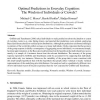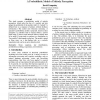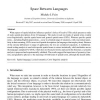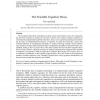COGSCI
2008
13 years 11 months ago
2008
According to the Perceptual Symbols Theory of cognition (Barsalou, 1999), modality-specific simulations underlie the representation of concepts. A strong prediction of this view i...
COGSCI
2008
13 years 11 months ago
2008
How children go about learning the general regularities that govern language, as well as keeping track of the exceptions to them, remains one of the challenging open questions in ...
COGSCI
2008
13 years 11 months ago
2008
Griffiths and Tenenbaum (2006) asked individuals to make predictions about the duration or extent of everyday events (e.g., cake baking times), and reported that predictions were ...
COGSCI
2008
13 years 11 months ago
2008
Examples from Archimedes, Galileo, Newton, Einstein, and others suggest that fundamental laws of physics were--or, at least, could have been--discovered by experiments performed n...
COGSCI
2008
13 years 11 months ago
2008
This study examines the working memory systems involved in human wayfinding. In the learning phase 24 participants learned two routes in a novel photorealistic virtual environment...
COGSCI
2008
13 years 11 months ago
2008
This study presents a probabilistic model of melody perception, which infers the key of a melody and also judges the probability of the melody itself. (A "melody" is def...
COGSCI
2008
13 years 11 months ago
2008
Historians of science have pointed to essentialist beliefs about species as major impediments to the discovery of natural selection. The present study investigated whether such be...
COGSCI
2008
13 years 11 months ago
2008
What aspects of spatial relations influence speakers' choice of locative? This article presents a study of static spatial descriptions from 24 languages. The study reveals tw...
COGSCI
2008
13 years 11 months ago
2008
Two experiments investigated the mechanism by which listeners adjust their interpretation of accented speech that is similar to a regional dialect of American English. Only a subs...
COGSCI
2008
13 years 11 months ago
2008
The recognition that human minds/brains are finite systems with limited resources for computation has led some researchers to advance the Tractable Cognition thesis: Human cogniti...




